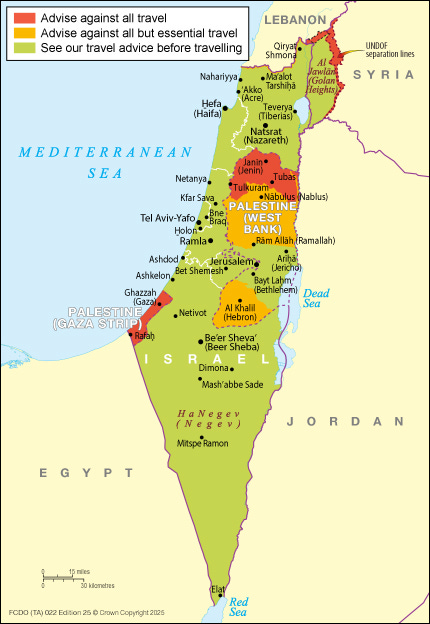Where or What is Palestine?
Is it Jerusalem, Gaza, West Bank?
It is all of the above. The West Bank is carved out of the far west of Jordan, far from Amman, the capitol of Jordan. On the west, a small strip of land was occupied by the native Arabs.
West Asia (also called Western Asia or Southwest Asia) is the westernmost region of Asia. As defined by most academics, UN bodies, and other institutions, the subregion consists of Anatolia, the Arabian Peninsula, Iran, Mesopotamia, the Armenian highlands, the Levant, the island of Cyprus, the Sinai Peninsula, and the South Caucasus.[4][5] The region is separated from Africa by the Isthmus of Suez in Egypt, and separated from Europe by the waterways of the Turkish Straits and the watershed of the Greater Caucasus. Central Asia lies to its northeast, while South Asia lies to its east. Twelve seas surround the region (clockwise): the Aegean Sea, the Sea of Marmara, the Black Sea, the Caspian Sea, the Persian Gulf, the Gulf of Oman, the Arabian Sea, the Gulf of Aden, the Red Sea, the Gulf of Aqaba, the Gulf of Suez, and the Mediterranean Sea. West Asia contains the majority of the similarly defined Middle East. The Middle East is a political term invented by Western geographers that has historically included various territories depending on political and historical context, while West Asia is a geographical term with more accuracy and consistency. It excludes most of Egypt and the northwestern part of Turkey, and includes the southern part of the Caucasus.
The history of East Asis is replete with conflict, invasions, and religious wars . Palestine is. recognized by 159 countries of the world.
Why is it important?
General Overview
The United Nations General Assembly has granted Palestine non-member observer state status since November 2012
.Regional Recognition Patterns
Middle East and Asia: Early recognitions came from countries like Iran, Iraq, Jordan, Bahrain, Saudi Arabia, Kuwait, Qatar, UAE, Oman, Turkey, Malaysia, Indonesia, Pakistan, and Afghanistan
.
Africa: Most African nations have recognized Palestine, including Algeria, Libya, Morocco, Tunisia, Sudan, Mauritania, Somalia, and South Africa
Europe: Several EU countries have recognized Palestine, including Sweden (2014), Norway, Ireland, Spain, Slovenia, Malta, Bulgaria, Cyprus, the Czech Republic, Hungary, Poland, and Romania
France, the UK, and Canada have indicated recognition in 2025
.Latin America & Caribbean: Countries like Cuba, Venezuela, Argentina, Brazil, Chile, Peru, Bolivia, Ecuador, Nicaragua, Dominican Republic, and Barbados recognize Palestine
Oceania: Vanuatu and Papua New Guinea have also recognized the Palestinian state
G20 and Western Nations
Among the 20 largest economies:
Recognize Palestine: Argentina, Brazil, China, India, Indonesia, Mexico, Russia, Saudi Arabia, South Africa, and Turkey.
Do not recognize (with some recent additions in 2025): United States, Japan, South Korea, Germany, Italy.
Recent 2025 recognition announcements: Australia, Canada, France, and the United Kingdom have indicated plans to recognize Palestine at the UN General Assembly
Summary
Total UN member states that recognize Palestine: 150 of 193, or about 78%
Recognition is widespread in Asia, Africa, and Latin America, expanding gradually in Europe and parts of Oceania.
Some major Western nations, including the United States and Japan, continue to withhold recognition, often citing peace negotiations between Israel and the Palestinians as a condition.
General Overview
The State of Palestine was declared by the Palestine Liberation Organization (PLO) on 15 November 1988, claiming the West Bank (including East Jerusalem) and the Gaza Strip. Since then, recognition has grown steadily, with many developing countries recognizing Palestine early on, followed in more recent years by additional European and G20 countries
The United Nations General Assembly has granted Palestine non-member observer state status since November 2012
Regional Recognition Patterns
Middle East and Asia: Early recognitions came from countries like Iran, Iraq, Jordan, Bahrain, Saudi Arabia, Kuwait, Qatar, UAE, Oman, Turkey, Malaysia, Indonesia, Pakistan, and Afghanistan
Africa: Most African nations have recognized Palestine, including Algeria, Libya, Morocco, Tunisia, Sudan, Mauritania, Somalia, and South Africa
France, the UK, and Canada have indicated recognition in 2025.
Latin America & Caribbean: Countries like Cuba, Venezuela, Argentina, Brazil, Chile, Peru, Bolivia, Ecuador, Nicaragua, Dominican Republic, and Barbados recognize Palestine
Oceania: Vanuatu and Papua New Guinea have also recognized the Palestinian state
G20 and Western Nations
Among the 20 largest economies:
Recognize Palestine: Argentina, Brazil, China, India, Indonesia, Mexico, Russia, Saudi Arabia, South Africa, and Turkey.
Do not recognize (with some recent additions in 2025): United States, Japan, South Korea, Germany, Italy.
Recent 2025 recognition announcements: Australia, Canada, France, and the United Kingdom have indicated plans to recognize Palestine at the UN General Assembly
May 14, 1948
Israel became a state on May 14, 1948. On this day, Jewish Agency Chairman David Ben-Gurion proclaimed the establishment of the State of Israel in Tel Aviv, coinciding with the expiration of the British Mandate over Palestine. This occurred at the end of World War II. A Ship containing some survivors of the holocaust and the near extermination of 6 million Hebrews (Jews waited in the Eastern Mediterranean Sea. It was a small contingent of Jews who had to battle their way into the Middle East despite a long history of Jews living in perpetual threats of annihilation dating back to the early days of the region. They faced Assyrians, Canaanites, Philistines, and Egyptians. The Egyptians used them as slaves to build temples, pyramids, and to serve the Pharaohs. Everyone knows the biblical story of Moses’ demands to “Let my people go.” Several natural disasters, such a plagues, locusts, and the death of their firstborn sons. Whether this was due to divine intervention or biological effects is still open to dispute among non-Jews of the world.
The Palestine Liberation Authority was declared the ruling authority of Palestine, and was divided into Gaza, the West Bank, and Jerusalem. Although originally intended to be a democracy, the original head of Palestine became autocratic and failed to hold elections.


